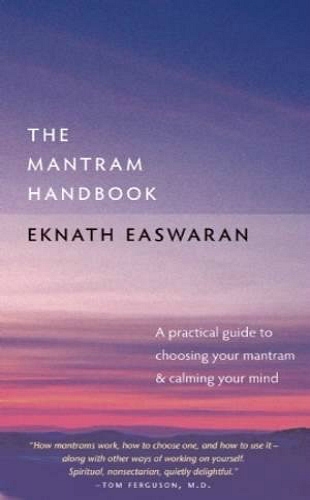Eknath Easwaran (1910 - 1999) is respected around the world as a teacher of meditation and an authentic guide to timeless wisdom. His approach fits naturally with any faith or philosophy, and brings universal ideals into daily life. In 1961, he founded the Blue Mountain Center of Meditation (BMCM), which continues his work today. Easwaran is the author of many books; more than 1.4 million copies of them are in print. This new edition of The Mantram Handbook includes a foreword by Daniel H. Lowenstein, Professor of Neuroscience at the University of California, San Francisco.
The mantram or mantra, as it is often called, is a spiritual word or short phrase that can be repeated silently in the mind as a means of connecting with God or getting in touch with our inner wisdom. Every religious tradition has one and they can be used even though you are not a member of that tradition. Here are a few examples:
Jesus has been used by Christians.
Hail Mary or Ave Marie has been used by Catholics.
Baruk attah Adonai has been used by Jews.
Allah or Bismillah ir-Rahman ir-Rahim has been used by Muslims.
Om mani padme hum has been used by Buddhists.
Rama, Rama has been used by Hindus.
The mental repetition of the holy name is one of the best ways of practicing what Brother Lawrence, the seventeenth-century Christian mystic, called the presence of God. You can use your mantram while walking, doing chores, or when you are falling asleep. This handy spiritual resource adds meaning to the many moments during the day when nothing much is happening or when we are doing a regular routine. It is a comfort and a support during times when you are angry, afraid, nervous, or worried. And it can provide assistance as we try to shed our likes and dislikes and work to keep our mind at ease. Easwaran sees one of its primary advantages:
"With the mantram we regain our natural energy, confidence, and control, so that we can transform everything negative in us and make our greatest possible contribution to the welfare of those around us."
Easwaran also suggests that we use the mantram whenever we are caught by fear, anger, greed, resentment, and impatience. In India, as well as in other traditions, it is customary to sing the mantram beside a dying person. This can prove beneficial not only for the family but also for the person who is dying. The mantram serves as calming force in the face of fear and confusion. Easwaran notes:
"If we are able to repeat the mantram at the moment of death, the great mystics tell us, we merge into God just as a bursting bubble becomes one with the sea."
Using the mantram every day will help it take root in your consciousness. Easwaran has done us all a great moral service with this fine and comprehensive presentation of this exquisite spiritual discipline.
